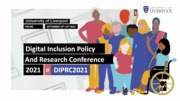 | DIPRC2021: Digital Inclusion Policy and Research Conference Online Liverpool, UK, September 14, 2021 |
| Submission link | https://easychair.org/conferences/?conf=diprc2021 |
| Conference program | https://easychair.org/smart-program/DIPRC2021/ |
Digital Inclusion, Policy and Research Conference (DIPRC) 2021 - 14 September 2021
The past year has changed our relationship with digital technologies for the foreseeable future. As countries came in and out of lockdowns, people’s main channels of communication transferred to digital services, platforms and apps. Everything ‘went online’: our families, friends, partners, health, work, news, politics, culture, arts and protesting. We became glued to different screens, having to juggle different facets of our lives through digital services and apps.
The pandemic has brought many digital policy issues to the fore. It has highlighted to policymakers and the public the ‘hidden’ challenges and impacts of digital exclusion and inequalities. Some people have had more access to digital systems and devices than others. Some people had better social and economic conditions to handle the new reality we were facing. For many, previous inequalities and digital divides were exacerbated and made everyday life even more difficult. Educational divides were entrenched through digital inequalities as children and students studying at home and online. Similarly for access to health information via digital channels.
The pandemic has seen Big tech companies flourish, benefitting from our reliance on their platforms to stay connected. The immediate collaborations between governments and technology companies, what Naomi Klein calls the Screen New Deal, have also introduced new challenges for civil society in shifting power relations in a time where many question their position in our lives. But while platforms have helped us get updates about what is happening, we also saw an increase in online manipulations, from disinformation to misinformation and on into conspiracy theories. In a global crisis, when getting correct information is paramount, potential distortions about covid, vaccines, media, politics and our neighbourhoods can have significant consequences.
We also saw people starting to push back on the transfer of decision making to automated or semi-automated digital systems that influenced people’s lives. We had the A-Level protests by young students across the UK who protested the automation of their grades that harmed the marginalised. We also saw tech company workers from Alphabet, Amazon and Facebook start to create unions and object to the way these companies treat their workers, subscribers and the environment. Citizens across the world joined the #BlackLivesMatter protests following George Floyd’s murder as well as protesting the use of body cameras and spying devices to suppress ethnic communities.
All of these issues are at the intersection of research policy and practice around digital inequalities, inclusion, literacies and harms. In this third edition of the Digital Inclusion, Policy and Research Conference (DIPRC) 2021, we invite scholars and practitioners to talk about their latest work in what many consider as a crucial point for digital inclusion, digital divides and data literacy. Who got left behind and struggled the most during the pandemic? What new digital practices emerged from the pandemic to help people manage their well-being and survival? Did technology interventions such as contact tracing apps actually help manage the pandemic? How did different communities organise to assist each other via digital means? How did different governments and local municipalities respond to digital literacy challenges? How is mainstream media implicated in how we understand what is happening?
The conference aims to focus on the recent global developments influenced by the pandemic in research, policy, and practice. Over this short time digital inequalities, digital inclusion and digital literacies have changed in response to global developments. However, key themes have remained important such as: material and financial access; skills and digital literacy; use by citizens and communities; the impact of socio-economic factors; motivation and attitudes; and more recently socio-economic and socio-cultural variations in patterns of usage. Digital inequities therefore have become an important part of broader persistent issues of social equity and justice.
Submission Guidelines
The primary aim of this conference is to link up international policy efforts to address digital inequalities, access and skills. The intention is to support sharing best practice and research insights. The conference will be a mix of invited presentations from policy and research colleagues, along with open paper sessions.
Abstracts should be no more than 300 words. Abstracts should be submitted by 31st May 2021.
Please submit your abstract here: https://easychair.org/conferences/?conf=diprc2021
List of Topics
For the open sessions, we seek presentations and papers that cover empirical research as well as policy and practice interventions, on topics such as:
- Data analysis of levels of digital inclusion/exclusion and engagement.
- Case studies of initiatives and programmes.
- Case studies of community impact.
- Studies of the impacts of digital exclusion and inequalities.
- Policy interventions to address digital inequalities.
Given that 2020 and 2021 have been dominated by the impacts of the COVID pandemic, which has itself revealed huge digital inequalities, we also invite papers on:
- Disinformation/misinformation and digital literacy during the pandemic.
- Studies on the link between misinformation and data literacies.
- Government, community and voluntary sector responses to digital literacy needs.
- Digital platform use and 'big tech' responses to the pandemic.
- Community responses to digital needs due to the pandemic.
Please submit your abstract here: https://easychair.org/conferences/?conf=diprc2021
Venue
The conference will be free to attend this year and held online - events will be scheduled to facilitate as far as possible attendance from all time zones.
Important dates
Date for submitting abstracts - 31st May 2021
Date for announcing acceptances - End of July 2021
Date for speakers to confirm participation - Mid August 2021 at latest.
Contact
For questions and other inquiries please email Dr. Elinor Carmi - Elinor.Carmi@liverpool.ac.uk
We look forward to seeing you in September!
Sponsors
This conference is supported by the University of Liverpool and Nuffield Foundation via the "Me and My Big Data" project.
